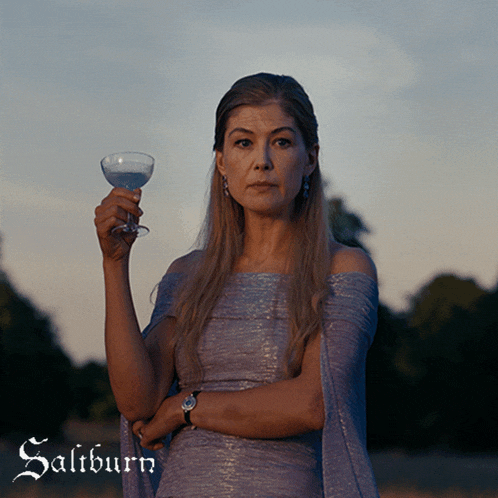5 Reasons To Watch ‘Saltburn’ (No Spoilers)
If you have yet to watch this witty-suspense-wtf-just-happened film, it’s best to not know anything about the plot prior to watching. At least that’s what the TikTok consensus advises. Although it’s hard not to know a few details about the plot if you’re engaged on any social media platform, mainly TikTok, it would be a fun experiment to go into this film blindly. And in hindsight you’ll be wishing that you were blind during a few scenes.
I liked Saltburn for the story outline, just imagining the plot lines in typed form sends me into a writer’s field of dreams. However, to say that I enjoyed Saltburn is a whole different idea or way of describing how I was socially invested in seeing this film before and how a little worn out and disheveled, yet pleased I felt after the last scene of the film. So without divulging any savory details (you can Reddit or go on Letterboxd if you’re that plot hungry), I can give you some good reasons you may actually appreciate watching Saltburn.
Well, Jacob Elordi
Let’s get the most obvious out of the way, Jacob Elordi. Unless you’re living under a rock, this young Aussie whose career is currently on the rise, is not only easy on the eyes but a good actor. The majority of us discovered his acting skills on Euphoria and most recently in the Sofia Coppola film Priscilla where he portrays Elvis Presley. He was good in Saltburn, with a very convincing English toff accent and everything from his tousled hair, piercings and rich boy attire brought us back to 2007.
The rest of the cast.
The entire Saltburn cast is exceptional in that I can’t imagine anyone else playing them. Richard E. Grant as Sir James Catton, the patriarch of the family, delivered gravitas and gentle, but stern uncle if that’s more relatable for you. Rosamund Pike played the matriarch, a former model, part-time lesbian in her past life before turning into devoted Lady of the castle and agreeable mother of two. She portrayed a most brilliant, dry, posh, but vulnerable English woman. The daughter Venetia (Alison Oliver) and the outlier cousin, Farleigh (Archie Madekwe) were believable with interesting character anecdotes. Then of course the lead role of Oliver Quick played by Barry Keoghan was so utterly convincing that I almost want him to only play villains. We cannot forget Carey Mulligan who played Pamela, the family’s forlorn friend who was severely going through some stuff. As brief as her role was, her beauty and fashion sense is not forgotten.
EMERALD (EFFING) FENNELL
Saltburn was written and directed by BAFTA and Oscar winner Emerald Fennell, which she won for Promising Young Woman. The English actress, filmmaker and writer creates from what she knows. Fennell knew all about the livelihood of Oxford University and the people who studied there. I believe that most of the Saltburn script is based off people she knows or learned about within British social circles and some of it was (hopefully) from her creative imagination. Fennell is a remarkable storyteller, personally she had me at Promising Young Woman, so I will watch anything and everything she writes and directs.
Let this film serve as a reminder to check in with your own mental health.
You can take that in any feasible way that suits you. It doesn’t take very long into the film that you start to realize the anxiety ridden behavior of Oliver. The fact is that you could meet an Oliver-type in any kind of social setting whether it’s academic, workplace or family. The film’s portrayal of an unhinged person disguising himself as a friend among other things, is a telltale sign that deception is more common than you think. The thing is, Saltburn does leave you feeling unsettled. It’s not a movie with emotional rollercoasters, but be sure line up all your self-care necessities. You’re going to need some mental health refreshers.
You will embrace the uncomfortable.
I believe that films and books should make you feel uncomfortable, it means that there’s room for afterthought. Not all films need to do that of course, but Saltburn, well I wonder how many therapists have had to sit through a session listening to a patient babble on about a bathtub scene. If it’s so well-written of a story, the uncomfortable is necessary and can make sense to you later on (even long after you’ve watched the film). In writers terms, the uncomfortable is what makes it all novel fodder, helping to drive the plot and complete a protagonist or antagonist character arc.



























